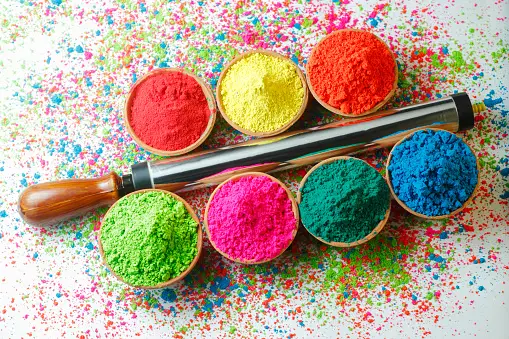Holi originated and is predominantly celebrated in the Indian
subcontinent, but has also spread to other regions of Asia and parts of the
Western world through the Indian diaspora. The Hindu calendar is lunisolar but most festival dates are specified
using the lunar portion of the calendar. Holi is celebrated at the end of
winter and the beginning of spring, on the last full moon day of the Hindu
calendar month of Falgun.
Typically observed in March in India,
Nepal, other South Asian countries and across the diaspora, the festival celebrates love and
signifies a time of rebirth and rejuvenation — a time to embrace the positive
and let go of negative energy.
Holi is a
festival celebrating the triumph of good over evil and the heavenly love shared
by Lord Krishna and Radha. It is also celebrated as a harvest festival to honour the arrival of
spring and the end of winter.
Beyond India, these legends help to explain the significance of Holi
(Phagwah), which is common in some Caribbean communities of Indian origin such
as Guyana, Suriname, and Trinidad and Tobago. It is also celebrated with great
fervour in Mauritius, Fiji, and South Africa.
These celebrations often include live music, dance performances, and delicious Indian food. In South Africa, the Holi festival has taken on a unique flavour, with events often including traditional Indian music and dance, as well as local South African music and food.
Typically spanning two days, the eve of the Hindu holiday is when traditions commence, but the actual day of Holi is the most anticipated due to the fun that ensues. Bonfires and the throwing of bright colors are significant in celebration, in addition to the relaxation of Hindu social codes.
Holi, a festival of unity and togetherness, is celebrated worldwide with diverse cultural integrations, symbolizing the victory of good over evil and encouraging harmony among different communities and religions.
It's not just in
India. It is also widely enjoyed in countries like Britain and
other parts of Europe too. Once widely celebrated in India and Nepal, Holi has now spread to
different parts of the globe. Being away from home, students studying abroad
miss the fun they have in their home country. To make them feel at home and
increase cultural awareness, Universities celebrate the festival of colors
around the world.
Holi is celebrated globally.
Bulgarian locals celebrate the
festival of colours in Ruse City, Bulgaria. Celebrated with extravagant
enthusiasm.
Melbourne Holi Festival's main objective is to
celebrate unity in diversity and bring our communities together on the occasion
of Holi. It's three days of Culture –
Colours – Food – Song and Dance – Live Performances, and much, much more.
Our neighboring country, Nepal celebrates the festival of Holi, which is
known locally as Fagu Purnima. People gather in the streets, smearing each
other with coloured powders and spraying water in a jubilant display of
camaraderie.
IN London also Holi festival takes place. Guests can expect laser- and
light-themed indoor and outdoor raves, and a mini Bollywood festival with dhol
players, dance, circus performers, and workshops. There will be plenty of food
stalls, too, where you can get your dose of dosas, chaat, and biryani.
In the US, cities with large Indian populations, such as New York
City, Los Angeles, and San Francisco, are popular destinations for Holi celebrations.
India’s festival of colours has spread its wings worldwide and everywhere it’s the time to celebrate with varied colours. Do join the celebrations.
HAPPY HOLI




No comments:
Post a Comment